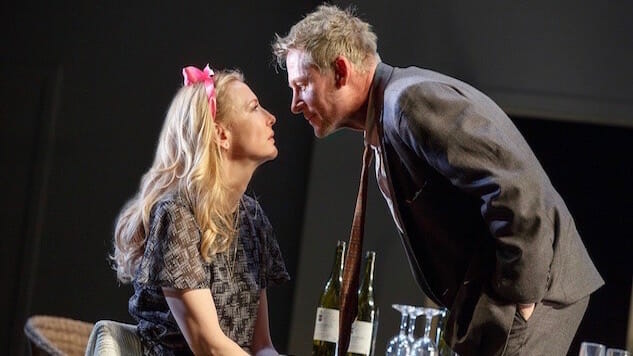Review: The Present
Joan Marcus
It’s a shame that Cate Blanchett’s Broadway debut has to be in such a mediocre play. She and Richard Roxburgh (Uncle Vanya), who plays her lover, are absolutely enrapturing. The play? Not so much. Still, it’s obvious why Blanchett, Roxburgh and director John Crowley (Tony nomination, The PIllowman) would chose such a work to delve into. The Present is an adaptation of a play from Chekhov’s early years, Platonov. Debuting in 2015 at the Sydney Theater Company and adapted by Andrew Upton, Blanchett’s husband, the work is no short of a classic Chekhovian drama. There are extraordinary characters, all with ferocious desires—something that makes a Chekhov play, even if performed awfully (this one was not), kinetic with the electricity that comes from forbidden human emotions. Blanchett is known for choosing this type of work—Notes on a Scandal and Carol come to mind. She has a knack for playing characters with the I-want-to-but-no-I-can’t throughline. As much as the play suffers from its intrinsic lackluster script, it succeeds in its performances and the questions it ponders. Walking away from the show on a cold New York night, the struggles the characters have with love, identity and purpose seem all the more, frighteningly, resonate.
The stage is set in 1990s Russia at the end of the Soviet reign. Blanchett plays Anna Petrovna, a beautiful, flirtatious and deceptively sweet landowner. We open on her 40th birthday where she’s gathered old friends at her deceased husband’s estate. As the play unfolds, the forbidden romance between Petrovna and schoolmaster Mikhail Platonov (Richard Roxburgh) becomes apparent—and dangerous. By the end of the first act, once everyone is good and drunk and teetering in their chairs, an impending doom looms over the birthday cake and champagne. In classic Chekhovian fashion, each character has become more intertwined with one another; affairs arising between past lovers, new acquaintances and all exacerbated by the sticky bonds of family and longtime friends. When the curtain fell on act one, half the audience seemed to think the play might have ended. How much more drama could these people create? The vodka wasn’t helping.
Act one is slow to start, but the last third of it is wonderfully combustive. It can be hard to follow a Chekhov play purely because there are a LOT of characters and a LOT of long, Russian names to remember. Your brain is playing catch up with each character’s backstory and relationship history while also trying to relax into the emotional trajectory of the play. It’s a difficult balancing act. The Seagull accomplishes this challenge more eloquently—Chekhov spending more time on each character and outlining their desires more clearly. Upton’s adaptation here illuminates the levity in the script, which is much needed, but still one has a difficult time emotionally connecting with anyone but Blanchett—and perhaps because everyone already is.
-

-

-

-

-

-

-

-

-

-

-

-

-

-

-

-

-

-

-

-

-

-

-

-

-

-

-

-

-

-

-

-

-

-

-

-

-

-

-

-








































